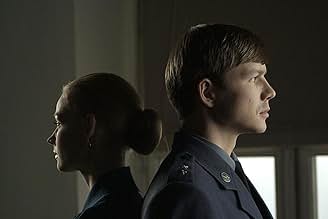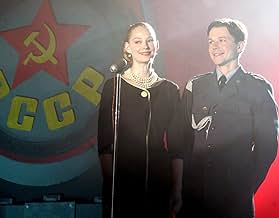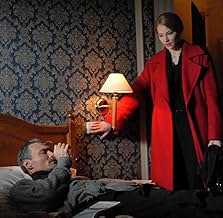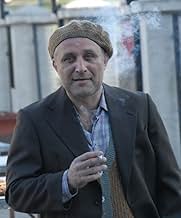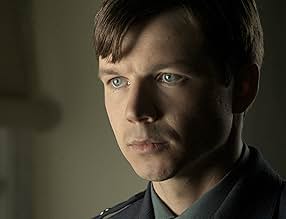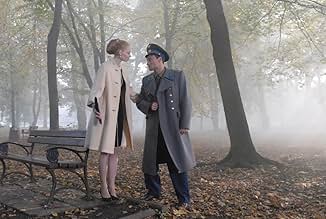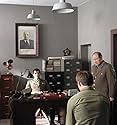Adicionar um enredo no seu idiomaDuring the Cold War, a married young Soviet woman and a Polish officer are drawn together by music.During the Cold War, a married young Soviet woman and a Polish officer are drawn together by music.During the Cold War, a married young Soviet woman and a Polish officer are drawn together by music.
- Direção
- Roteirista
- Artistas
- Prêmios
- 7 vitórias e 8 indicações no total
Dmitriy Ulyanov
- Jura
- (as Dmitrij Uljanov)
Artyom Tkachenko
- Sajat
- (as Artem Tkachenko)
Yuriy Itskov
- Oficer Polityczny
- (as Jurij Itskov)
Aleksey Gorbunov
- Major KGB
- (as Aleksiej Gorbunov)
Avaliações em destaque
Although the action of the film takes place in times of war, the film has a very clear romantic "touch" , thanks to photography, music and locations, in contrast to the relentless and ruthless attitude of the Russian military.
Hit the fact that Michal not seem to be aware of the risk to which both are exposed, while Wiera does, so a tension is created due to this contrary behaviour.
Story is told through two timelines, which makes the movie more realistic.
I did not expect the ending, and was ........ surprising.
8/10
Hit the fact that Michal not seem to be aware of the risk to which both are exposed, while Wiera does, so a tension is created due to this contrary behaviour.
Story is told through two timelines, which makes the movie more realistic.
I did not expect the ending, and was ........ surprising.
8/10
poetic, gentle, delicate, profound, sad, sea of nuances. axis - a love story in cage of Cold War. memories of a Russian officer and questions of his daughter. silhouette of wife. bricks of a cruel political system. and a tale about feelings, basic gestures and dimension of fear. about power of courage and sacrifice as only key of normal things. it is not good movie. just perfect to discover roots of old similar stories. instrument - special beauty of actors, Polish and Russian language, few crumbs of romanticism and picture on a grave. a cross on the grave of a child and cried of a man at Gagarin death. not very much. but more than a film, it is a seed. and a testimony. remember of a time - a long and painful 1968. and occasion to meet, again, map of Poland soul. a woumb, impossibility to forgive, need to present old scares for understand, accept and learn about essence of a nation
A movie about thetraditional hate between polish and russians, but also a movie about blind love.A movie like americans never been capable to make.A movie with many political exagerations but a lesson of playing , telling the story , and direction.
It's an interesting film with a romance between a minor Polish military officer and a wife of a Russian officer stationed in a huge military base in Poland's Lower Silesia. A daughter is born out of the romance and the mother dies. We only find out in the end how it all happened when she, the daughter, and the widower visit the grave of the dead woman in Poland again after some twenty years. The same Russian actress who plays the mother plays the daughter role. More than half of the film is in Russian. There is fine music included of Ewa Demarczyk sung by the actress perhaps. It's in Polish with an accent with some Russian lyrics added. (We saw Demarczyk sing these songs at the Town Hall, NYC, winter 1987.)
1967, Legnica (headquarters of the Soviet forces stationed in Poland from 1945 until 1990). The city, with the largest Russian army, is a Soviet enclave closed to outsiders, including Polish citizens, during this time. Yuri (Dmitry Ulyanov) is a young Russian pilot and failed astronaut posted to Legnica with his even younger wife Vera (Svetlana khodchenkova). Vera learns Polish and becomes fascinated with Polish music and poetry. At the Polish-Soviet "friendship song contest" she meets Polish officer and musician Michał (Lesław Żurek). The story inexorably leads to tragedy as Vera desperately tries to stop herself from falling in love with Michał, equally desperately tries to hide her infatuation when this fails. For starters I need to say that when I start watching Mała Moskwa I was not expecting the emotional ride that was ahead of me. As foreigner living in Poland for more than half decade I can say that only now I start to be aware of the background and story on this country, and It's obvious us that the II world war left scars that even time will not heal. When the great Wajda picked up the theme of "Katyn" I was anxious to see this emotional twirl of muffled hurtful feelings come on screen, but I was disappointed by how the excess of a big production made it look just an expensive visual document of an historical event, but washed of any human emotion, distant and cold. Now on the hands of Waldemar Krzystek, we have again the Russian occupation theme, but in such a deep poetic human way that your reaction watching it it's just speechless. Tears fall inside and outside as Krzystek leads you into an emotional reconstitution of what this times where. Trough is remarkable direction the "unreal" and poetic performances come so close to your heart and brain. Like a drug that Hypnotizes you, is the best way for me to describe the images that Krzystek produces. Mała Moskwa is for sure a high standard piece of cinema which for me it belongs only to master pieces and this is without doubts one of them. A special word for the stunning performances for all cast but specially for the unique Svetlana khodchenkova, which the word brilliant is not enough to define.
Principais escolhas
Faça login para avaliar e ver a lista de recomendações personalizadas
Detalhes
- Data de lançamento
- País de origem
- Central de atendimento oficial
- Idiomas
- Também conhecido como
- Little Moscow
- Locações de filme
- Empresas de produção
- Consulte mais créditos da empresa na IMDbPro
Bilheteria
- Faturamento bruto mundial
- US$ 967.443
- Tempo de duração1 hora 54 minutos
- Cor
- Mixagem de som
Contribua para esta página
Sugerir uma alteração ou adicionar conteúdo ausente

Principal brecha
By what name was Mala Moskwa (2008) officially released in Canada in English?
Responda
